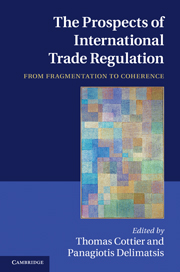Book contents
- Frontmatter
- Contents
- List of figures
- List of tables
- Contributors
- Preface and acknowledgements
- Table of cases
- List of abbreviations
- Introduction: fragmentation and coherence in international trade regulation: analysis and conceptual foundations
- PART I Constitutional issues in international trade regulation
- PART II Reforming specific areas of trade regulation
- PART III ‘Trade and…’ linkages
- 8 A call for a WTO ministerial decision on trade and human rights
- 9 The protection and promotion of cultural diversity in a digital networked environment: mapping possible advances towards coherence
- 10 Development and stability in the nexus between trade and finance
- 11 The regulatory framework of international investment: the challenge of fragmentation in a changing world economy
- 12 Low-income countries and commodity price volatility
- Index
- References
10 - Development and stability in the nexus between trade and finance
from PART III - ‘Trade and…’ linkages
Published online by Cambridge University Press: 26 April 2011
- Frontmatter
- Contents
- List of figures
- List of tables
- Contributors
- Preface and acknowledgements
- Table of cases
- List of abbreviations
- Introduction: fragmentation and coherence in international trade regulation: analysis and conceptual foundations
- PART I Constitutional issues in international trade regulation
- PART II Reforming specific areas of trade regulation
- PART III ‘Trade and…’ linkages
- 8 A call for a WTO ministerial decision on trade and human rights
- 9 The protection and promotion of cultural diversity in a digital networked environment: mapping possible advances towards coherence
- 10 Development and stability in the nexus between trade and finance
- 11 The regulatory framework of international investment: the challenge of fragmentation in a changing world economy
- 12 Low-income countries and commodity price volatility
- Index
- References
Summary
KEY MESSAGES
∙ The international regulation of asset trade differs substantially from that of trade in goods and services. In particular, since the breakdown of the Bretton Woods system, multiple authorities including the International Monetary Fund (IMF), the World Bank, the Bank for International Settlements (BIS), and the Organisation for Economic Co-operation and Development (OECD) have retained partly overlapping responsibilities for regulating asset trade.
∙ There are enormous differences between countries in their level of financial development which, by and large, coincide with the differences in economic development. Financial underdevelopment appears to be primarily the result of an incomplete protection of property rights, which manifests itself in aggravated risks for financiers of being expropriated by the political elite or a corrupt bureaucracy.
∙ Financial crises are recurrent and have, at least temporarily, affected most countries during recent decades. Owing to financial globalisation, distress within the financial system tends to be transmitted more rapidly across national borders.
∙ A coherent system of international financial regulation ought to create favourable results in terms of fostering the development and improving the stability of the financial system. Such a framework is most likely to find support from the relevant stakeholders.
∙ Owing to the aggravated level of uncertainty in financial transactions, coherence in international financial regulation necessitates a framework that is at the same time open to regulatory competition and based on commonly shared experiences, and which stipulates some mutually recognised minimum standards. Amid the complexities underlying the international exchange in assets, such an approach is the most suitable to identify and embody the rules that foster the development and stability of the financial system.
- Type
- Chapter
- Information
- The Prospects of International Trade RegulationFrom Fragmentation to Coherence, pp. 394 - 416Publisher: Cambridge University PressPrint publication year: 2011



